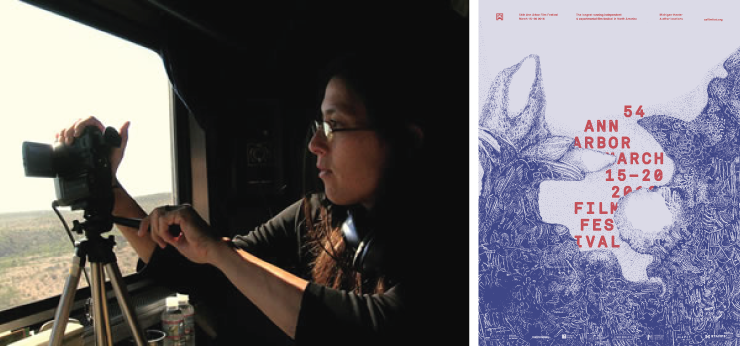Q&A with 54th Ann Arbor Film Festival Executive Director Leslie Raymond

I recently stopped by the busy Ann Arbor Film Festival office to chat with Leslie Raymond about the upcoming 54th Ann Arbor Film Festival running March 15-20, 2016. Leslie has been involved with the AAFF since the 30th Festival in 1992; this will be her third year as the Festival’s Executive Director.
Q: What’s new or different about this year’s Festival?
A: Well, we’re seeing a lot of animation. We’re also seeing a lot of feature length documentaries, nine or ten of which are in competition, as well as three films by Chantal Akerman who passed away tragically last October. We felt she was such an important figure in the history of avant-garde cinema as well as a great role model for women.
Q: Why do you think there are more documentaries this year?
A: Yeah, David [Dinnell, program director] and I were talking earlier about this being a more “moving image” culture where so much of the information we receive now comes through the moving image because of its ubiquity. Now we can shoot a movie on our cellphone, edit it, and publish it in minutes. Maybe that has something to do with it, although I don’t know why that would draw somebody more to making something more documentary than narrative.
Q: Which of the Festival events excite you the most this year?
A: Grahame Weinbren’s 78 Letters - which will show on Sunday, March 20 at 3:15 pm in the Main Auditorium - is an interactive series of one-minute pieces where the audience will help direct how the work goes together. I’m particularly excited about that. There will also be a 1975 installation by Lis Rhodes at the Ann Arbor Art Center on Friday, March 18 from 3 to 5 pm. It’s titled Light Music and it’s composed of two 16 mm projectors projecting abstract imagery from either end of the viewing space with an optical soundtrack read by light passing through. We’re also excited about the live shadow puppet performance by local artist Tom Carey that opens the “Films in Competition 5 (Ages 6+)” event. We call it “family friendly” and “ages 6 and up” but it’s not just a “kid’s show.” One of the things important for us is to engage audiences on other levels than just being a passive observer.
Q: Do you think audiences are more receptive today to an interactive experience?
A: I think so. And we want to provide opportunities for Festival viewers to be part of the fabric of the environment. Along these lines we have the “What We Saw” cards in the lobby -- we’ve done this for several years now -- where we invite participants to fill the cards out, let us know what they think about what they’ve just seen, and then take pictures of them for a slide show. There will even be an Oculus Rift piece in the grand foyer of the Michigan Theater -- a 9-foot inflatable bubble! -- where people will be able to put on the Oculus Rift and have an 8 or 9-minute Oculus Rift experience.
Q: I know someone who’s coming to the festival for the first time. What do you want her to take away from the experience?
A: We’d want her to feel the empowerment of seeing a lot of different things about the world. I think there’s so much to be said for being able to access all of these different viewpoints and ways of expressing things that go far outside the mainstream culture. We’d want her to experience the richness and diversity we live in. So I’d hope that somebody coming for the first time would see things they’re not familiar with...and be okay with that.
Q: The legacy of the AAFF as the longest-running independent and experimental festival in North America is an honor for Ann Arbor. Do you feel a sense of responsibility that Festival goers leave with a sense of that history?
A: I do think about it a lot. I feel like it’s a huge responsibility. The Festival has been here since 1963 and it still embodies the ethos in which it was founded - that particular time and place in history where there was such a rich political, social, and even fashion culture in every direction you looked. I think this heritage ties directly into the diversity of independent cinematic voices and our embracing of that diversity of expressions. It’s still relevant. So I think it’s important to stay grounded in the Festival’s history while also moving toward the future using the technologies that will now allow for much more of this experimentation.
Q: Any final thoughts on this year’s Festival?
A: I’ve been thinking lately about the sense of the collective journey. For a lot of people who are invested in joining us for the whole week – or even if you’re only coming to a few programs – there really is a sense of embarking on something unknown with a spirit of adventure. There are all kinds of things to discover, conversations to be had, thoughts to be thought, and feelings to be felt. Part of it is looking at the work and having the opportunity to share it with those you came with or walk out of the screening and then run into someone in the lobby and talk about what you’ve just experienced.
Amy Cantú is a Production Librarian at AADL.
The Ann Arbor Film Festival runs from March 15-20, 2016. Tickets are available at the door or online.


































